Hameeda Begum explained her arduous journey from the Himalayan region of disputed Kashmir to the hot and humid room in the Agra Central Jail where she was waiting to see her son.
A man in his early twenties offered her a bottle of water, saying, "Don't lose hope. You are not alone."
Hameeda, 70, drew a long sigh. She placed her hand on the man's hand and spoke in a barely audible voice.
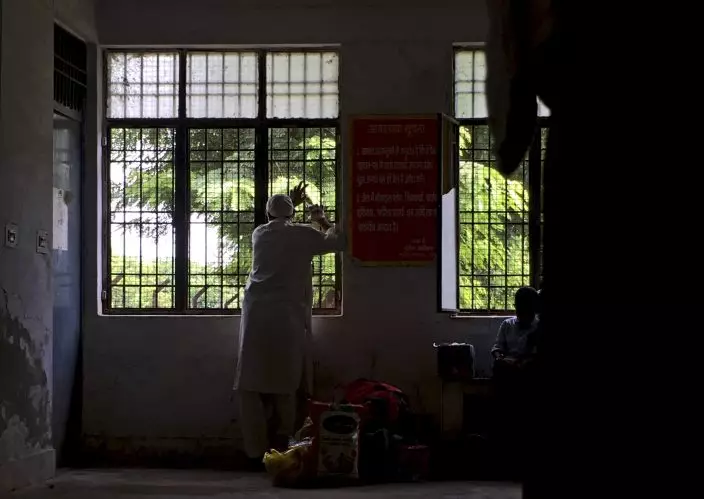
A Kashmiri man holds on to iron grills of a window as he awaits his turn to meet his son at Agra Central Jail in Agra, India, Friday, Sept. 20, 2019. Families from the Himalayan region of Kashmir have traveled nearly 1,000 kilometers (600 miles) in sweltering heat to meet relatives being held in an Indian jail in the city of Agra. At least 4,000 people, mostly young men, have been arrested in Indian-held Kashmir since the government of Prime Minister Narendra Modi imposed a security clampdown and scrapped the region’s semi-autonomy on Aug. 5, according to police officials and records reviewed by AP. (AP PhotoAltaf Qadri)
"May God give us patience," she said, as other Kashmiri families watched as they sat on a steel bench, waiting to see their own jailed relatives.
After waiting patiently for hours, Hameeda's name was announced and she was called inside a room.
Some 20 minutes later, she emerged a different person. Restive and tense earlier, she said she was now happy and relieved.
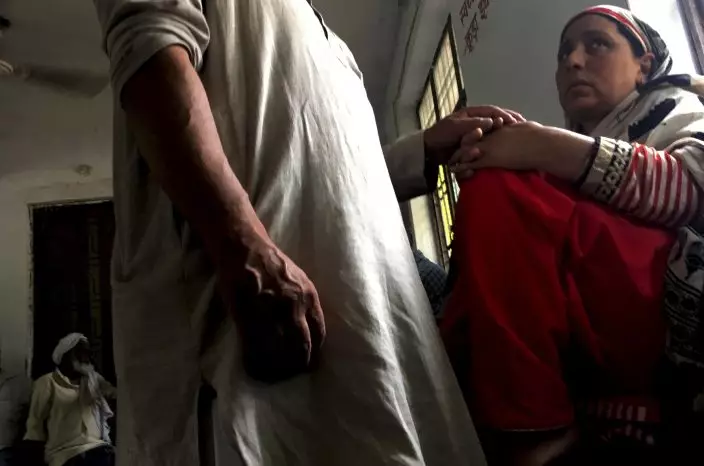
A Kashmiri man comforts his wife inside the waiting room of Agra Central Jail as they wait for their turn to meet their son in Agra, India, Friday, Sept. 20, 2019. Families from the Himalayan region of Kashmir have traveled nearly 1,000 kilometers (600 miles) in sweltering heat to meet relatives being held in an Indian jail in the city of Agra. At least 4,000 people, mostly young men, have been arrested in Indian-held Kashmir since the government of Prime Minister Narendra Modi imposed a security clampdown and scrapped the region’s semi-autonomy on Aug. 5, according to police officials and records reviewed by AP. (AP PhotoAltaf Qadri)
"Seeing my son was like celebrating the Eid festival," she said. "After all, I am a mother."
Hameeda and the man, Gowhar Malla, traveled together about 600 miles (965 kilometers) from Kashmir over two days to reach the Indian city of Agra. Unknown to each other before their journey started, the two pursued a common goal: To see family members arrested by Indian authorities and held in the city's largest prison.
Many Kashmiris are being held in Agra Central Jail after the government of Hindu nationalist Prime Minister Narendra Modi imposed an unprecedented security clampdown in Indian-held Kashmir, cutting virtually all communications and scrapping the region's semi-autonomy on Aug. 5.
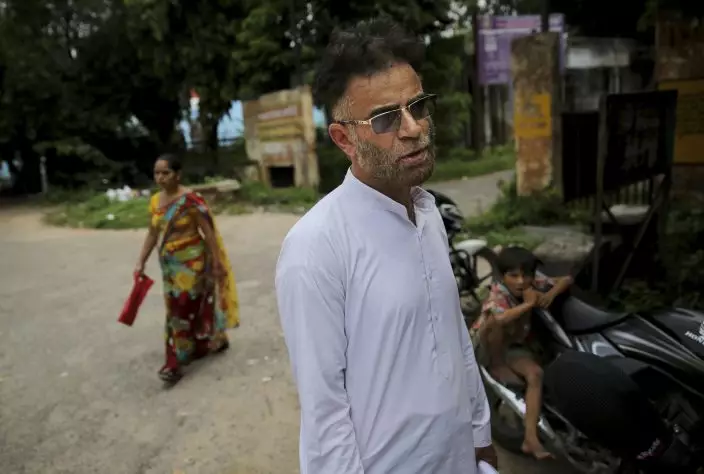
Mohammad Ashraf Malik, a Kashmiri man whose son is lodged in Agra Central Jail, speaks with the Associated Press outside the jail, in Agra, India, Friday, Sept. 20, 2019. His son, Aasif Ashraf, is still recovering from three bullet wounds in his abdomen which he received during protests in March, Malik said. Arrested months before the day that Kashmir’s semi-autonomy was withdrawn, Aasif was moved to the jail in Agra after being rearrested by police in August. “Police arrested him from his hospital bed in Srinagar when he was being treated. They arrested and rearrested him so many times and then finally jailed him here,” Mohammad said. “Which country in the world jails an injured person who is recovering from bullet wounds?” (AP PhotoAltaf Qadri)
Thousands of Indian troops were sent to the region, already one of the most heavily militarized in the world.
At least 4,000 people, mostly young men, have been arrested there since then, according to police officials and records reviewed by AP. Officials say at least 3,000 have since been released and that fixed telephone line service has been restored.
About 250 of those still being held have been moved to various Indian jails outside Kashmir.
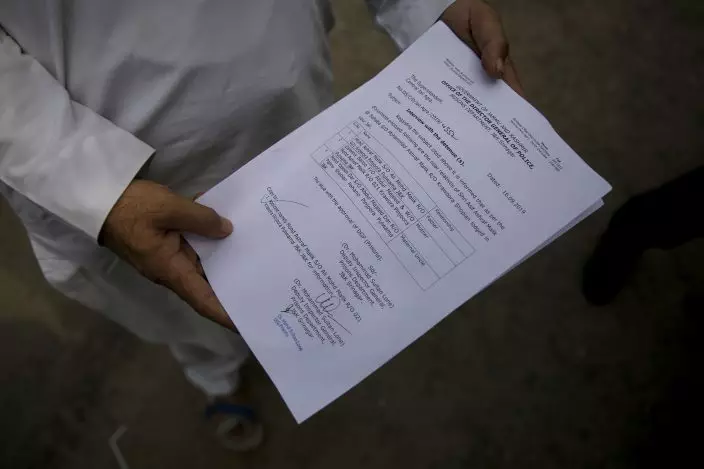
Mohammad Ashraf Malik, a Kashmiri man whose son is lodged in Agra Central Jail, shows a permission letter to meet his son as he speaks with the Associated Press outside the jail, in Agra, India, Friday, Sept. 20, 2019. His son, Aasif Ashraf, is still recovering from three bullet wounds in his abdomen which he received during protests in March, Malik said. Arrested months before the day that Kashmir’s semi-autonomy was withdrawn, Aasif was moved to the jail in Agra after being rearrested by police in August. “Police arrested him from his hospital bed in Srinagar when he was being treated. They arrested and rearrested him so many times and then finally jailed him here,” Mohammad said. “Which country in the world jails an injured person who is recovering from bullet wounds?” (AP PhotoAltaf Qadri)
The records show that nearly 300 of those arrested are being held under the Public Safety Act, which allows authorities to hold people for up to two years without trial.
For years, human rights groups have accused Indian troops of controlling the population of Kashmir with physical and sexual abuse and unjustified arrests. Indian government officials deny this, calling the allegations separatist propaganda.
The conflict over Kashmir has existed since the late 1940s, when India and Pakistan won independence from the British empire. The countries have fought two wars over Kashmir, and each controls a portion of the region.
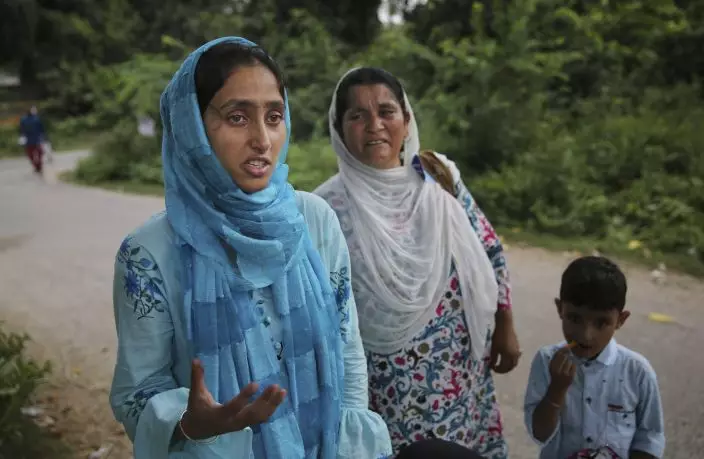
Maryam Rasool, wife of a Kashmiri prisoner Aamir Parviaz Rather who is lodged in Agra Central Jail, speaks with the Associated Press after meeting her husband, as her mother-in-law cries in Agra, India, Friday, Sept. 20, 2019. Rather was picked up by the armed forces on the morning of Aug. 6 and held in various jails in Kashmir before being moved to Agra. The family was seeing him for the first time in 48 days. “We hugged each other and cried. His face was swollen because of the heat. If they keep him for long, he won’t survive,” Maryam said, tugging her 5-year-old son closely to her. (AP PhotoAltaf Qadri)
A full-blown armed rebellion against Indian control began in 1989 seeking a united Kashmir, either independent or under Pakistani rule. Since then, about 70,000 people have been killed in the conflict, which India sees as a Pakistani proxy war.
The latest actions by the Indian government have further worsened the situation in the pristine valley, where most Kashmiris resent the Indian troop presence and support the rebels.
Hameeda remembered the morning of Aug. 5 when her son, whom she didn't want to be named for fear of retribution from the authorities, was picked up from his bedroom by the armed forces and put in a Srinagar jail.
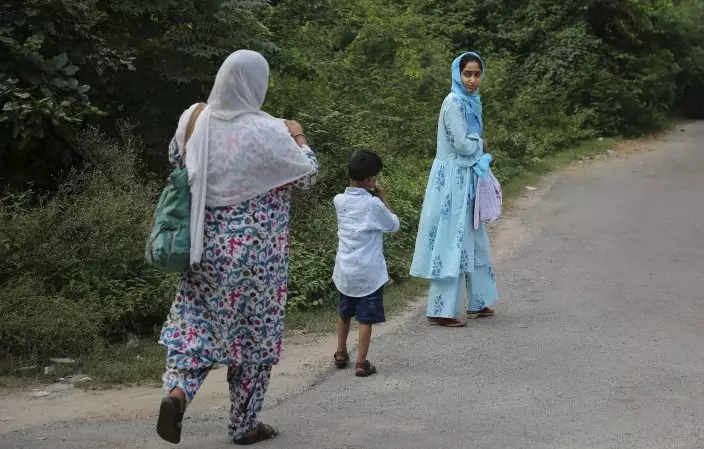
Maryam Rasool, wife of a Kashmiri prisoner Aamir Parviaz Rather who is lodged in Agra central jail, walks with her mother-in-law and son after meeting her husband in Agra, India, Friday, Sept. 20, 2019. Rather was picked up by the armed forces on the morning of Aug. 6 and held in various jails in Kashmir before being moved to Agra. The family was seeing him for the first time in 48 days. “We hugged each other and cried. His face was swollen because of the heat. If they keep him for long, he won’t survive,” Maryam said, tugging her 5-year-old son closely to her. (AP PhotoAltaf Qadri)
"They entered his room forcibly and dragged him out of his bed," she said.
Hameeda spent the next 10 days trying to find her son in various jails in Kashmir. She even traveled to far northern districts bordering Pakistan but found no information about her son's whereabouts.
Then one day the news came.
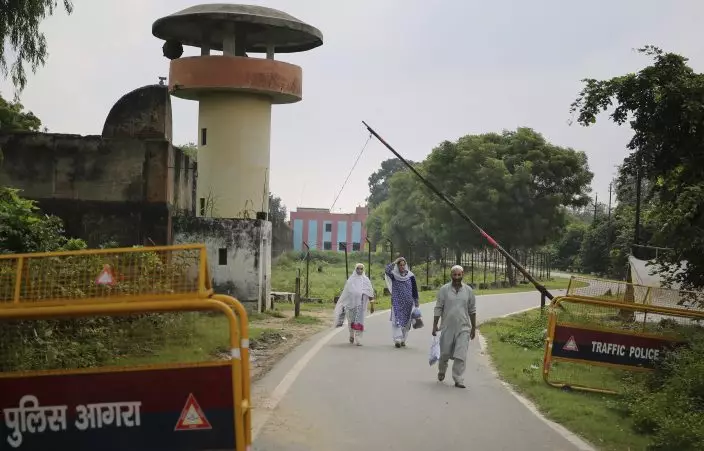
Kashmiris leave the Agra Central Jail premise after meeting a relative lodged in the jail, in Agra, India, Friday, Sept. 20, 2019. Families from the Himalayan region of Kashmir have traveled nearly 1,000 kilometers (600 miles) in sweltering heat to meet relatives being held in an Indian jail in the city of Agra. At least 4,000 people, mostly young men, have been arrested in Indian-held Kashmir since the government of Prime Minister Narendra Modi imposed a security clampdown and scrapped the region’s semi-autonomy on Aug. 5, according to police officials and records reviewed by AP. (AP PhotoAltaf Qadri)
A stranger knocked at her door and gave her a message.
Her son was in Agra.
"I hadn't even heard the name of this place before. If it weren't for these people, I would have lost myself in this big city," she said, pointing to other Kashmiri families waiting at the jail to see their relatives.
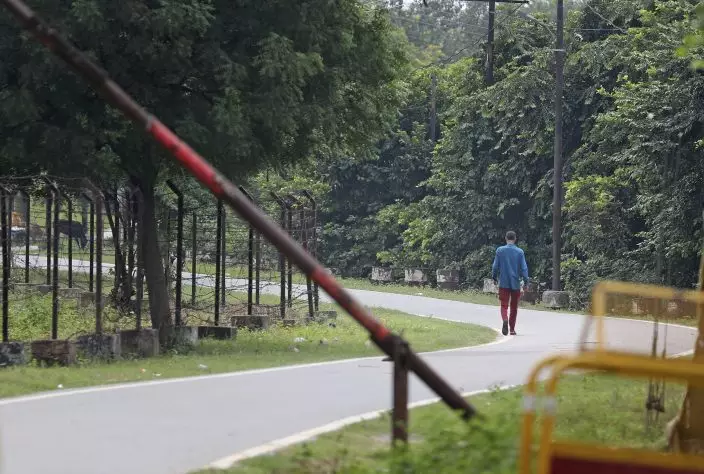
A Kashmiri man walks in the Agra Central Jail premise after meeting his brother-in-law who is lodged in the jail, in Agra, India, Friday, Sept. 20, 2019. Families from the Himalayan region of Kashmir have traveled nearly 1,000 kilometers (600 miles) in sweltering heat to meet relatives being held in an Indian jail in the city of Agra. At least 4,000 people, mostly young men, have been arrested in Indian-held Kashmir since the government of Prime Minister Narendra Modi imposed a security clampdown and scrapped the region’s semi-autonomy on Aug. 5, according to police officials and records reviewed by AP. (AP PhotoAltaf Qadri)
In interviews conducted by the AP, the Kashmiri families spoke about the arrests that followed Aug. 5 and how they struggled to find their loved ones.
For Gowhar Malla, the trip from Kashmir to Agra to see his sister's husband cost his family almost $1,000. He said he borrowed the money from his relatives.
"Seeing him means the world to me. I don't care about the debt I am in," Gowhar said.
His brother-in-law, Aamir Parviaz Rather, was picked up by the armed forces on the morning of Aug. 6 and held in various jails in Kashmir before being moved to Agra. The family was seeing him for the first time in 48 days.
Aamir's wife, Maryam Rasool, spoke about how her husband's health was worsening in jail because of the extreme humidity and heat.
"We hugged each other and cried. His face was swollen because of the heat. If they keep him for long, he won't survive," Maryam said, tugging her 5-year-old son closely to her.
Her mother-in-law grabbed her loosely hanging scarf and wiped her tears as she heard Maryam speak.
"We are living under oppression," Maryam said.
Agra's deputy inspector general for prisons, Sanjeev Tripathi, refused to give any information about the Kashmiri prisoners in Agra Central Jail.
"I have been specifically told by the government not to give any details to the media," Tripathi said.
Fear of the authorities made the families rush hurriedly from the prison compound after their visits.
One man said he was told by police officers stationed outside the prison gate not to talk to anyone because the fate of their loved ones was "hanging by a thread."
As the dusty narrow lane leading to the jail compound filled with vehicles carrying worried family members, an exhausted Mohammad Ashraf Malik of southern Shopian district in Kashmir ran to get prison documents copied at a local shop.
His son, Aasif Ashraf, is still recovering from three bullet wounds in his abdomen which he received during protests in March, Malik said.
Arrested months before the day that Kashmir's semi-autonomy was withdrawn, Aasif was moved to the jail in Agra after being rearrested by police in August.
Malik said he managed to finally see his son after days of struggle.
"Police arrested him from his hospital bed in Srinagar when he was being treated. They arrested and rearrested him so many times and then finally jailed him here," Mohammad said.
"Which country in the world jails an injured person who is recovering from bullet wounds?"
Follow Sheikh Saaliq at twitter.com/sheikh_saaliq






